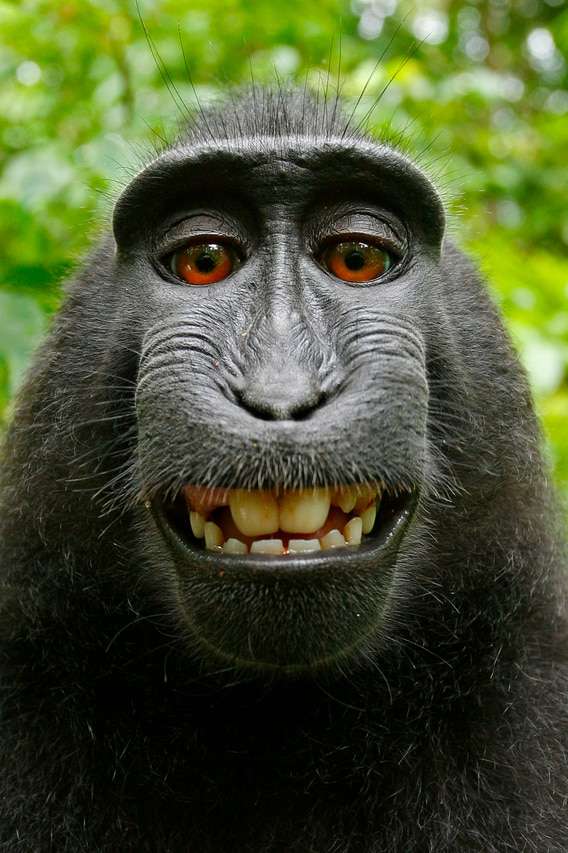The Volokh Conspiracy
Mostly law professors | Sometimes contrarian | Often libertarian | Always independent
No monkey business here: The monkey selfie copyright case is over -- for now

[Updated response to comments posted at end - 9-18017]
The G.M.S.C. - the Great Monkey Selfie Controversy - has, perhaps, come to an end.
Everyone, I suspect, knows the background by now (if not, details can be found here and here). David Slater, a professional wildlife photographer, left his camera on a tripod at his campsite on the Indonesian island of Sulawesi, where he was working at the time. A troop of macaque monkeys entered the campsite and began, in typical monkey fashion, to toss things about. One of them grabbed hold of Slater's camera and started pressing buttons. Slater later retrieved the camera and discovered that there were a bunch of photos on it that had been snapped by the monkey, including the now-world-famous - and truly spectacular - monkey selfie.
In 2015, PETA - People for the Ethical Treatment of Animals - filed suit against Slater in U.S. District Court for the Northern District of California asserting (a) that the monkey (whose name, at least according to PETA, was "Naruto"), as the photographer, was the owner of the copyright in the photo, (b) that Slater had infringed Naruto's copyright by publishing a book containing this and other "monkey selfies and (c) seeking to be named a guardian ad litem of the monkey's rights in the photo. Judge William H. Orrick dismissed the claim on the grounds that the Copyright Act does not authorize vesting copyright ownership in nonhumans, and PETA appealed to the U.S. Court of Appeals for the 9th Circuit.
Last week, PETA and Slater announced a settlement: PETA agreed to drop its appeal, and Slater agreed to pay 25 percent of his future royalties from the photo to organizations involved in habitat-protection efforts in Sulawesi. An eminently reasonable win-win resolution of the matter, to be sure.
Two points, however, deserve further comment. First, though this may be the last we hear of the G.M.S.C., I suspect it will not be. The monkey's claim to the copyright was always weak (though not as far-fetched as many commentators suggested). It's not only that he's a monkey, and, for the many reasons well-summarized by Orrick, monkeys can't own copyrights. It's because copyright does not reward the random pressing of buttons; it rewards the creative mental processes that lie behind the pressing of the buttons, and as far as we know, Naruto did not engage in any such mental endeavor here. My two-year-old granddaughter loves to press buttons, too - but she wouldn't be entitled to the copyright in any photograph she may stumble upon, no matter how beautiful it turned out to be.
So while Naruto leaves the courthouse copyright-less, so too does Slater. Slater's claim to the copyright has always seemed to me to be if anything weaker than Naruto's. "I set up the camera" is no more a basis for a copyright claim than is "I pressed the button."
Now, I don't particularly begrudge Slater anything he has or will earn from this photo, even less so now that a portion of the proceeds will be plowed back into habitat conservation. But my guess is that someone will begrudge him a licensing fee at some point, and he might well make his way back into court to enforce what he sees as his rights in the photo.
And second: The parties' settlement motion (which was kindly sent to me by PETA's media department) asks the Ninth Circuit not only to dismiss PETA's appeal, but to vacate the earlier judgment by the district court. This (known in the trade as "vacatur") has the effect of wiping out the record of what had happened in the district court, in effect treating all of that, including Orrick's opinion, as if it had never occurred.
Vacatur is a common, but odious, practice in the federal courts. Orrick's decision is not private property that can be disposed of at the whim of the parties; it belongs to the public, created by a public employee at public expense, concerning the interpretation of federal law, applicable across the entire country (though Orrick's decision, of course, is only binding precedent within the confines of the Northern District of California [see Update below]). Why should we throw out his efforts just because the parties to the lawsuit, pursuing their own private interests, would like that to happen? The Competitive Enterprise Institute has submitted an amicus brief to the 9th Circuit (available here) arguing against the grant of vacatur here, and I very much hope the court takes the suggestion.
[RESPONSE TO COMMENTERS
As several commenters pointed out, I may have misstated the matter when I wrote that Judge Orrick's decision "is only binding precedent within the confines of the Northern District of California," pointing out that a district court decision isn't even binding within its own judicial district. My error - the prevailing (though, I gather from a little quick research, not the only) rule observed in the federal district courts is that prior decisions are not binding if identical issues arise in future cases. It strikes me, I must admit, as quite peculiar - I naively thought that the whole point of stare decisis was to ensure, to the extent possible, that like cases are decided the same way. But that will have to be the subject of a later discussion.
Notice that this makes vacatur even less defensible - a court has considered the question and give its reasoned analysis, and vacatur deprives future courts of even considering this as persuasive.]


Show Comments (0)